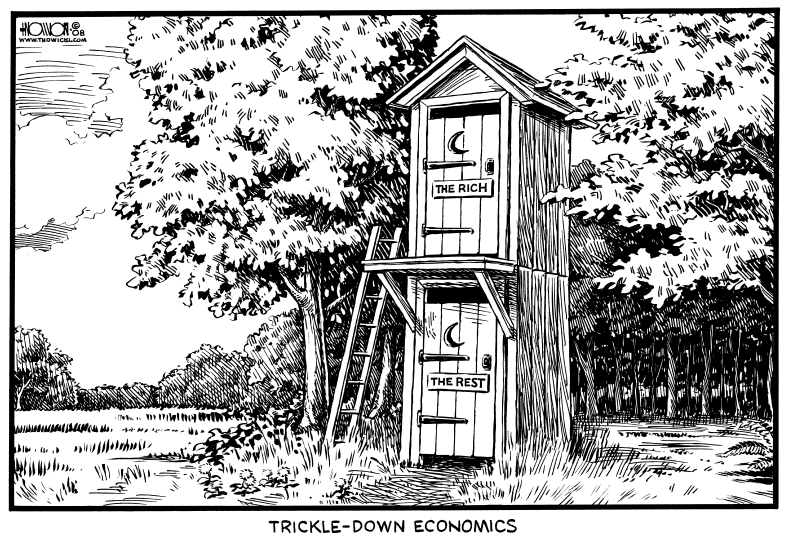Debunking Trickle-down Economics
In 1896,
William Jennings Bryan declared that, “There are two ideas of government. There
are those who believe that if you just legislate to make the well-to-do
prosperous, that their prosperity will leak through on those below.
The
Democratic idea has been that if you legislate to make the masses prosperous,
their prosperity will find its way up and through every class that rests upon
it.” Later, Lyndon B. Johnson added, in his brutally blunt style:
"Republicans [...] simply don't know how to manage the economy. They're so
busy operating the trickle-down theory, giving the richest corporations the
biggest break that the whole thing goes to hell in a hand basket."
This economic idea of “trickle-down” dates back to the
earlier horse-and-sparrow aphorism: “If you feed the horse enough oats, some
will pass through to the road for the sparrows.” In our time, it was formally
called “supply side economics.” Ross Perot called it “political voodoo.”
Whatever you call it, it has been a dominant political policy priority in many
governments and corporations for a long time. But, a metaphor producing an
easily-visualized image does not make it an apt model of reality.
So, how have we sparrows been doing down here under the back
end of the horse? In 2012, a European taxation research group concluded that:
“…wealth of the super-rich does not trickle down to improve the economy, but
tends to be amassed and sheltered in tax
havens with a negative effect on the tax bases of the home
economy.” Oops, that’s not so good.
The common philosophy of favoring those who need it the
least saturates the entire history of wars of conquest, colonialism, slavery,
unfair trade treaties, predatory loans and exploitation of others’ resources.
Remember that our own nation’s origins lie in our rebellion against colonial
exploitation. This view of things completely reverses the Ayn Rand idea of who
are “takers and makers.” Consider substituting the concepts of “privileged
elite” and “working poor.”
How should our nation treat lesser-developed countries who
may view us as the exploiters? While some economic inequality is inevitable,
the politically powerful and prosperous do well to remember that hoarding their
ill-gotten gains while others suffer in abject misery just doesn’t look good
and isn’t very nice either. It didn’t work for the thirteen American colonies
in 1776 and it still triggers opposition to “economic imperialism” now. I’m
reminded of George Monbiot’s comment that, “If wealth was the inevitable result
of hard work and enterprise, every woman in Africa would be a millionaire.”
How does it make you feel to know that people working
full-time at your favorite stores are still in poverty with no practical path
up? How does it make you feel if you’re the one working full time and still
dependent on government aid? It makes me feel like some corporations have found
a way to get the government (substitute “taxpayers like you and me”) to
subsidize the low wages and benefits that they make available to their
employees. That isn’t very nice either.
I do not believe that we all deserve equality of outcome.
But, what we do owe each other is equality of opportunity. We all expect
dignity, justice, and a fair chance. Growing inequality inevitably produces
social and political instability. These truths have been borne out by thousands
of years of struggle for survival, social progress and spiritual attainment.
David Satterlee

No comments:
Post a Comment